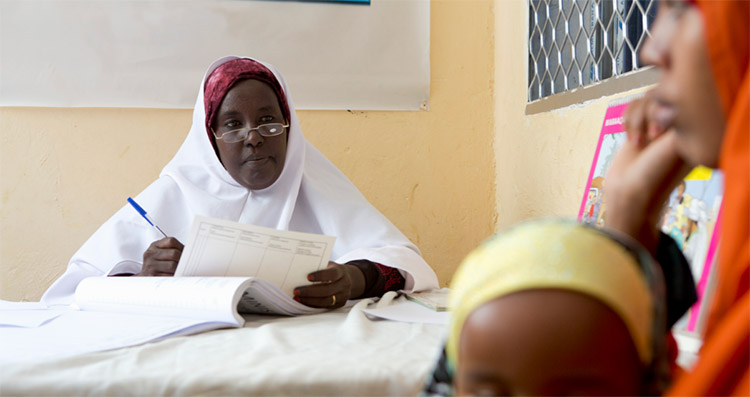
12 May 2019 ‒ Every year, International Nurses Day is celebrated on 12 May. This year’s campaign focuses on nurses as a voice to lead achievement of the Sustainable Development Goals (SDGs), attainment of health as a human right and achievement of universal health coverage (SDG 3.8) to ensure that no person is left behind without access to health care or impoverished because of their need for health care.
Strengthening nursing to support achievement of the SDGs has additional benefits, such as promoting gender equity (SDG 5) which tied into the theme of this year’s International Day of the Midwife “Midwives: Defenders of Women’s Rights”, celebrated globally on 5 May, and promoting sustained, inclusive and sustainable economic growth, full and productive employment and decent work for all (SDG 8).
These themes resonate with the WHO Regional Office’s “Vision 2023 ‒ Health for All by All”, which outlines a set of strategic directions for WHO’s work with countries to address regional health priorities. WHO acknowledges the commitment, passion and motivation of nurses and midwives in saving lives and improving health and well-being and recognizes the critical role that they play in achieving health for all by all and global development targets.
The Eastern Mediterranean Region, with a population of more than 600 million, faces an unprecedented scale of emergencies. Countries are at different levels of socioeconomic, political and demographic development and many are experiencing rapidly evolving health challenges. In responding to these challenges, a well-qualified and motivated health workforce is essential in ensuring that people can access good quality health services. Nurses and midwives constitute 50‒60% of the health workforce in the Region and they remain critical to providing primary health care, especially in the most challenging and remote settings where health care is most needed.
“Nurses and midwives are the backbone of any health care system and we commend their contribution to improving the health and well-being of all. Their ability to establish good relationships with the communities in which they work and their collaboration with other members of a health care team ensures the provision of good quality health care and coordinated services to individuals requiring those services,” said Dr Ahmed Al-Mandhari, WHO Regional Director for the Eastern Mediterranean.
The Region faces a shortage of nurses and midwives, especially in low- and middle-income countries. In addition, under-investment in the education of nurses and midwives has resulted in limited capacities to train a sufficient number of nurses and midwives with the appropriate competencies and skills to meet population health needs.
“Training an adequate number of nurses and midwives and deploying them where they are needed most requires considerable investment and strong political commitment and leadership. Increasing investment in this cadre of the health workforce will contribute to improved economic, social and health outcomes for countries of the Region. It will also improve women’s participation in the workforce in order that they can more greatly contribute to economic and social development,” Dr Al-Mandhari added.
To respond to the long identified shortage of nurses and well-trained midwives in the Region, the WHO Regional Office developed a framework for action to strengthen nursing and midwifery to provide Member States with a set of feasible, cost-effective short- and long-term actions to strengthen their nursing and midwifery workforces to support countries’ move towards universal health coverage and the SDGs. While some progress has been made, this progress has been patchy.
WHO and partners have declared 2020 as the Year of the Nurse and Midwife, in honour of the 200th birth anniversary of Florence Nightingale. WHO is a collaborating partner in the Nursing Now campaign, launched in early 2018. The 3-year campaign aims to improve health globally by raising the status and profile of nursing, demonstrating what more can be achieved by a strengthened nursing profession, and enabling nurses to maximize their contribution to achieving universal health coverage.
Seizing on the global momentum, the WHO Regional Office renews its commitment to strengthening nursing and midwifery in the Region and the issue will be discussed as an agenda item at the Sixty-sixth Session of the Regional Committee for the Eastern Mediterranean in October 2019.


